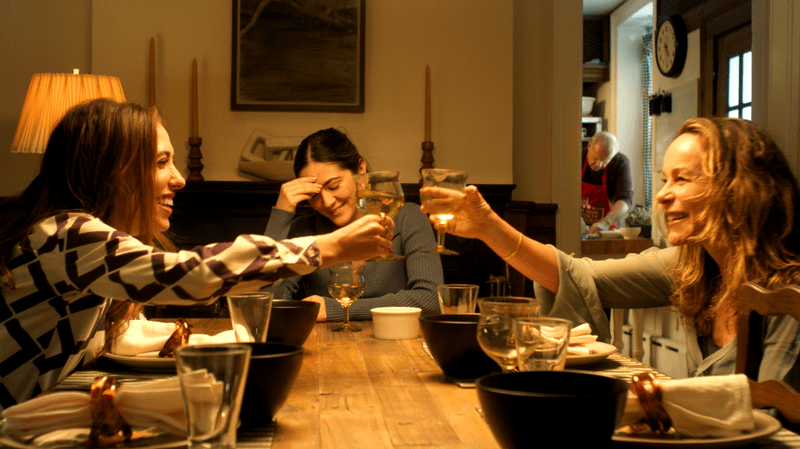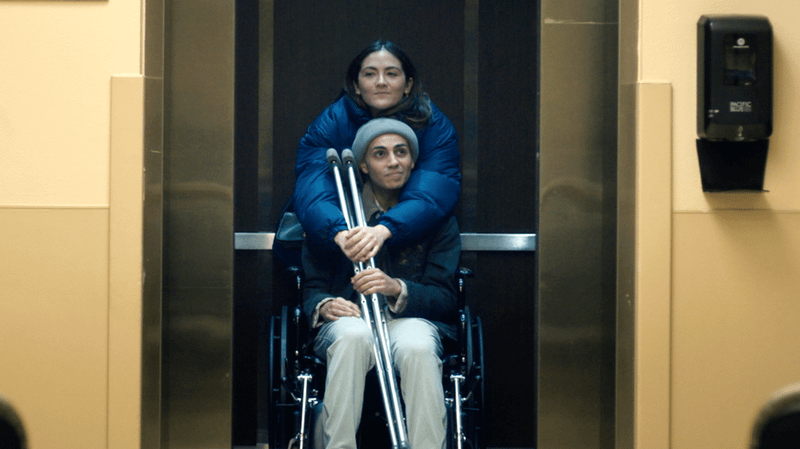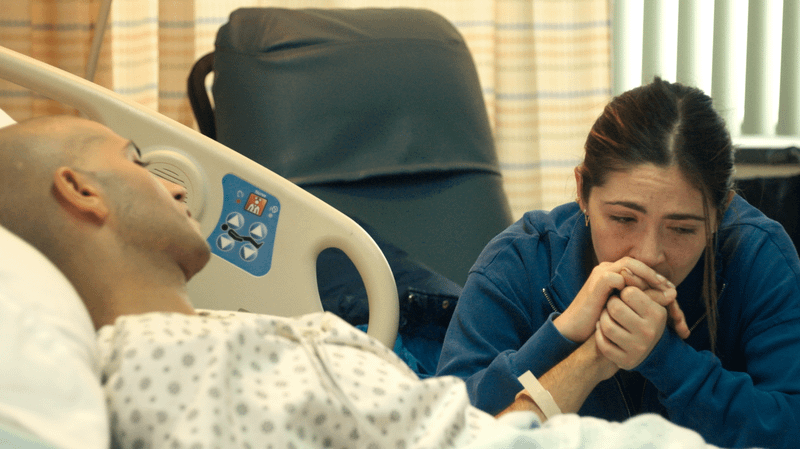Wish You Were Here tells a tragic love story between two brief lovers and one star of the film hopes it provides a particularly cathartic experience for audiences.
The movie, which Julia Stiles directed, follows Isabelle Fuhrman’s Charlotte and Mena Moussad’s Adam, two people who experience a brief and intense connection over the course of one night. Months later, Charlotte still thinks about Adam, despite how messy it ended—which is when she learns that he’s living out his final days with cancer.
Wish You Were Here is based on a book of the same name, which was first published in 2017 and written by Renee Carlino.
The Direct sat down with the leading stars of the film, Isabella Fuhrman and Mena Moussad, alongside Gabby Kono-Abdy (who is both a producer and “Helen” in the film) to discuss Wish You Were Here‘s tragic love story.
How Did Reading the Script First Affect the Stars?
“I Fell In Love With Every Single Character.”
- The Direct: “When you three first read the script, what were your immediate thoughts, and how did it initially affect you?”
Gabby Kono-Abdy: When I first read the book in 2016, I, first of all, devoured it in two hours. And I was so determined to bring this to the big screen, I fell in love with every single character. I saw myself in every single character. And I felt like this was a story that we needed as a society, as a reminder of what a cosmic connection really can be like, and what it can do to a person to take a risk and take a chance, and what it’s like to have a supportive best friend and a crazy, loving family, and then thinking about who to direct it. It was kind of easy. Julia Stiles.
Isabelle Fuhrman: I worked with Julia, and she sent me the script. She [said], ‘I’d love for you to read it. Think about being Charlotte.’ She’s like, ‘I’d love to make a movie with you where people can see you the way that I’ve gotten to know you because I feel like people have never seen you in a movie like this.’
So, I was really touched by that, and I really love the messages of the movie, the message of hope, the message of really jumping head first and being open to love no matter what the outcome. And coping with ghosting. But I really just loved the movie and the script and devoured the book in like two hours. And it was like a no-brainer.
Mena Massoud: As an actor, I’m always looking for arcs, the character arc. And this was a very obvious character arc of this young man whose life is deteriorating, and he goes on this journey, and it’s tragic. It’s not tragic per se because of the ending, but I think it’s tragic because he finds this connection that I think only happens to us once or maybe a couple of times in our lives, but he doesn’t have much time to enjoy it, and he’s trying to make the most of it, but under these horrible circumstances. A
nd so I wanted to go through that journey. I fell in love with the character. I fell in love with the story. And even from a physical aspect as well, I shaved my head for this role. I got to try to lose a bit of weight in the little time that I had from the beginning of the film to the end. So, it ticked a lot of boxes for me.
And then also getting to work with Isabelle, Gabby, and Julia. I love working with titans of industry, and Julia Stiles is definitely that. She’s done so many films like this in her career, so there was no better person to learn from, especially because I have done a few romantic films back-to-back-to-back, and she’s the queen of those kinds of films. I want to learn from her. It was a no-brainer.
How Did Stars Isabelle Fuhrman and Gabby Kono-Abdy Add to Their Characters

“Every Person Has Their Own Essence to Them That They Bring Into That Character.”
- The Direct: “When you were bringing these characters to life, what did you add to the characters that maybe wasn’t initially on the page, whether that be just small little quirks or traits, or whatever?”
Isabelle Fuhrman: I think that’s the beauty of casting, actually. It’s like when a director and a casting director put together who they want to be involved. You’re looking at a character on a page, but every person has their own essence to them that they bring into that character.
And I felt like with Charlotte, when I was reading it and as a script, and as a book, I was like, you know, personally in my own life, I’m a very Type-A, I know what I want, type of person. How am I going to play somebody that’s kind of lost? And I was like, but what if she doesn’t think that she is? She doesn’t think that she’s lost. She thinks she has a direction. It’s just that everyone around her just can’t see it, and maybe she can’t see it either, but she’s defensive about it.
And so I think I was able to play with certain parts of myself within it. And I think that’s my favorite part about acting. You find things that are very different from you in these characters. And then you can play with certain aspects of yourself within them. You can remove certain parts of yourself. And then, very often, I leave a role and take things with me. There are definitely things that I brought with me from Charlotte.
Gabby Kono-Abdy: And then you play off of one another and discover new things in that playing. It can totally morph a character and a role into something that you, the director, and everyone else are just like, ‘Wow. I didn’t see that.’ Because it’s so in person and intimate, and you show vulnerability with one another in a different way than you could have planned for.
Fuhrman: I totally didn’t expect that Gabby and I were gonna fall in love, madly in love. I was like, this best friend chemistry is almost–like we spent so much time together every single day. We were working on all these really deep scenes, and we got to talk and get to know each other. And that’s where I felt like Charlotte and Adam had this deep connection because, by the end, we could talk about anything. It was so easy to be around you and be in a scene with you.
And with Gabby. We met, and that best friend chemistry that you can spot if it’s not right, and Gabby [and me] really fell in love. I was like, ‘This is so easy. Like why do I need to say what’s on the page? Like we should just be tickling each other.’
What Does Moving Too Fast Look Like In a Relationship?

“I Think 90-Day Fiance Is Totally Appropriate.”
- The Direct: “The relationships in this movie unfold at a brisk pace. So I wanted to playfully ask you all, what do you consider to be too fast in a relationship?”
Gabby Kono-Abdy: Well, I mean, I got engaged to my husband after 90 days. So I am a big lover of love, so Helen and I have that in common. I think 90-day fiance is totally appropriate.
Mena Massoud: I didn’t know that, by the way. That’s still perfect for Helen.
Kono-Abdy: I know. Maybe it was like a little method acting going on, unbeknownst to me. I believe that when you know, you know. And I knew with my husband, and I think that Helene knows with Roddy, and I think Charlotte knows with Adam and Adam with Charlotte right away.
Massoud: Yeah, I think we’ve all had those moments. You know, even if it doesn’t turn into a relationship, where you lay eyes on someone and there’s an immediate spark,. There’s an immediate connection. You make eye contact, and there’s just something there. And I think we definitely want people to feel that in this film because it’s happened to all of us.
It probably happened to me when I was in elementary school. It happened again when I was in high school. I think it happens often. And those don’t always turn into relationships, but that kind of intimate connection, or that spark, I think, exists for everybody, and we definitely want people to feel that.
Isabelle Fuhrman: I love [the] line that Seth says in the film to Charlotte, that’s in the book as well, where he says, ‘I think different people connect with different parts of your soul.’ And I think that’s such a beautiful message because I feel like that’s very true. I mean, it’s very rare to meet one person and have one relationship and be with somebody forever, and those people are like, gosh, you’re incredibly lucky. And also, it’s not like it’s easy. Every relationship has ups and downs. They find the right person at the right time.
But to meet somebody and be with them, and have a soul connection and lose that, you know, you really have to take a step forward. And that’s what you [are] left with in the movie at the end: this sort of hope that Charlotte will meet somebody, whether it’s Seth or somebody else, who will connect with a different part of her soul. That this is not just—her life isn’t over because this is over. It will continue on, and probably because of this relationship, she will be in a much better place than she was at the beginning.
What Should Audiences Take Away From Wish You Were Here?

“… Have a Good Cry, and Come Out Feeling a Little Lighter.”
- The Direct: “When this movie is done and over, what do you want audiences to really take away from it the most?”
Mena Massoud: I personally want people to come see it. And, you know, let a little bit out of from their experiences. I think we’ve all been touched by cancer. And cancer is a part of this film. And I think for a lot of people, everybody deals with tragedy and mourning differently, but I think films and art are such a big way that we can all deal with our emotions, with our tragic experiences. And that’s something that sometimes big blockbuster action films don’t give you.
You really need this kind of film to go into the theater, have a good cry, and come out feeling a little lighter. And that’s something that I hope this film does for people because cancer is such a prevalent disease in our society, and it touches everybody, really. So, I want people to use this film to let it all out.
Isabelle Fuhrman: I think this movie has so many beautiful messages about love and unconditional love, and how we think that tomorrow is promised and that life just continues on the way that it does, but as we know, and especially in the last week, things can change in an instant, and you have to always be grateful for the people in your life and the people that you love.
And what I love about Charlotte is that she so bravely decides for herself that regardless of understanding what is going on with Adam and what could possibly happen, that she will be there unconditionally. I love him regardless, and I feel like that’s such a beautiful message to remind people of is, you never know. So just hold the people you look tighter and closer.
Gabby Kono-Abdy: And to remind people to take risks, right? We see Charlotte show resilience in this decision to live out days with him, and with that, she has this magnificent love that we get to vicariously through watching, have as well.
The full interview can be viewed below:
Wish You Were Here is now playing in limited theaters.
This post was originally published on here






